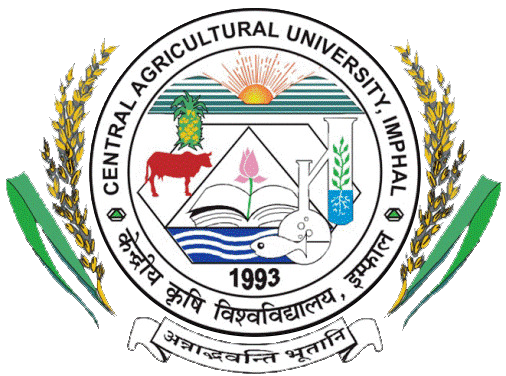About Central Agricultral University, Imphal
Introduction:
The Central Agricultural University has been established by an act of Parliament, the Central Agricultural University Act, 1992 (No.40 of 1992). The Act came into effect on 26th January, 1993 with the issue of notification by the Department of Agricultural Research and Education (DARE), Govt. of India. The University became functional with the joining of first Vice-Chancellor on 13th September, 1993. The jurisdiction of the University extends to seven North-Eastern Hill States viz., Arunachal Pradesh, Manipur, Meghalaya, Mizoram, Sikkim, Nagaland and Tripura, with headquarters at Imphal in Manipur.
Like other Agricultural Universities, Central Agricultural University, Imphal has integrated programmes of teaching, research and extension education.
Constituent Colleges Under CAU, Imphal
| Sl. No. | College | Location | Year Established |
|---|
| 1 | College of Agriculture | Imphal, Manipur | 1993 |
| 2 | College of Fisheries | Agartala, Tripura | 1998 |
| 3 | College of Veterinary Sciences & Animal Husbandry | Aizawl, Mizoram | 1998 |
| 4 | College of Horticulture & Forestry | Pasighat, Arunachal Pradesh | 2001 |
| 5 | College of Community Science | Tura, Meghalaya | 2004 |
| 6 | College of Agricultural Engineering and Post Harvest Technology | Gangtok, Sikkim | 2006 |
| 7 | College of Post-Graduate Studies in Agricultural Sciences | Umiam, Meghalaya | 2006 |
| 8 | College of Food Technology | Lamphelpat, Manipur | 2015 |
| 9 | College of Agriculture | Kyrdemkulai, Meghalaya | 2015 |
| 10 | College of Agriculture | Pasighat, Arunachal Pradesh | 2015 |
| 11 | College of Horticulture | Bermiok, Sikkim | 2015 |
| 12 | College of Horticulture | Thenzawl, Mizoram | 2015 |
| 13 | College of Vetenary Science and Animal Husbandry | Jalukie, Nagaland | 2016 |
Krishi Vigyan Kendras Under CAU, Imphal
| Sl. No. | KVK | Year Established |
|---|
| 1 | KVK Imphal East, Andro, Manipur | 2006 |
| 2 | KVK Pasighat, Arunachal Pradesh | 2006 |
| 3 | KVK Aizawl, Mizoram | 2006 |
| 4 | KVK East Garo Hills, Meghalaya | 2017 |
| 5 | KVK South Garo Hills, Meghalaya | 2017 |
| 6 | KVK Sephajala, Tripura | 2018 |
Objectives
- ⇛To impart education in different branches of agriculture and allied science as it may deem fit;
⇛ To further the advancement of learning and conducting of research in agriculture and allied sciences;
⇛ To undertake extension education programme in the states under its jurisdiction; and
⇛ To undertake such other activities, as it may deem fit, from time to time.
Keeping the mandates view, the mission of the university is to be a center of Excellence in teaching, research and extension education in the field of agriculture and allied sciences.
Goals
- To fulfill the mission, the university has set the following goals for itself:
⇛ To produce globally competitive graduates and postgraduates in agriculture and allied sciences;
⇛ To develop sustainable and profitable farming system for improving productivity, production and profitability in the agriculture and allied sectors;
⇛ To educate the extension functionaries for effective dissemination of agro technologies to the farmers, entrepreneurs and agro – industries; and
⇛ To be an important link in the chain for converting agriculture and allied vocations into profitable enterprises and providing food and nutritional security to the people of NE Region, and the world.
To meet the goals, the university has laid down the following objectives:
⇛ To establish and develop excellent constituent colleges that offer undergraduate and postgraduate education in various states of the NE region coming under the jurisdiction of the university in the field of agriculture, agricultural engineering, fisheries, home science, horticulture, forestry and veterinary science and animal husbandry;
⇛ To impart quality education so as to produce globally competitive graduates and post- graduates in different areas of agriculture and allied sciences including interdisciplinary areas, who are confident and capable of working as scientists, entrepreneurs, managers, agro-industrial workers and above all progressive farmers;
⇛ To establish research stations and specialized research laboratories for taking up basic and applied research by the scientists and postgraduate students;
⇛ To develop and demonstrate alternate farming systems which help the farmers to improve their productivity and profitability while preserving and improving the environment;
⇛ To establish transfer of technology centre including Krishi Vigyan Kendras (Farm Science Centres) for developing effective extension methodologies and training the trainers in information dissemination;
⇛ To popularize improved farming systems, technologies and equipment on pilot basis to be model for other extension agencies;
⇛ To offer short-term refresher and vocational courses and training programmes to the officials of state government departments, farmers, entrepreneurs and agro-industrial houses;
⇛ To have collaborations in the field of teaching, research, transfer of technology and developmental activities with the development departments of the states and national and international institutions including industrial and business houses;
⇛ To provide consultancy services to progressive farmers, agro-entrepreneurs, agro- industries and others involved in agriculture and allied sectors; and
⇛ To act as documentation and information centre on agricultural education, research, extension methodology and development.

